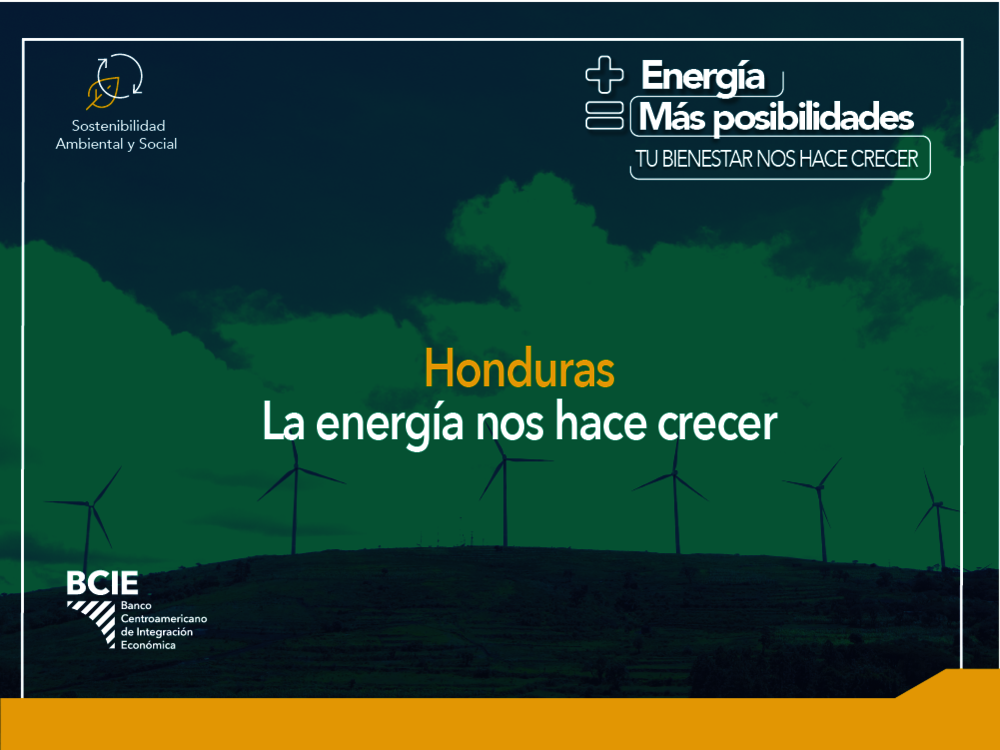CABEI, committed to strengthening the energy system for the benefit of millions of Hondurans

The multilateral promotes various initiatives to strengthen the electricity subsector, the promotion of renewable energy sources and improvements in efficiency
Tegucigalpa, February 17th, 2023.- Energy is essential for Honduras' social and economic development, which is why the Central American Bank for Economic Integration (CABEI) contributes to strengthening the electricity subsector with competitive and sustainable projects to boost the quality and efficiency of the country's energy supply.
In the last two years, CABEI implemented two Development Policy Operations (DPOs) with the Government of Honduras aimed at improving the subsector's operational and financial performance, including the reduction of losses, as well as increasing inclusive access to energy, strengthening compliance with international agreements on climate change and contributing to the transparency of public information in related projects.
"For CABEI, the energy sector in Honduras is a priority and we will continue to support it with different initiatives and projects aimed at achieving energy efficiency, expansion of coverage, sustainability and quality of service, incorporating financial mechanisms that strengthen the energy sector to achieve a more competitive and sustainable country," said CABEI Executive President, Dr. Dante Mossi.
Also, through the CABEI-financed Temporary Support Program for the Fuel Crisis, the Government of the Republic of Honduras provides a subsidy on the price of electricity to households with monthly consumption of less than 150 kilowatt hours (kWh) so that their bills remain at zero cost, which has benefited more than 3.8 million Hondurans.
In addition, with resources from Taiwan, the Bank's extra-regional partner country, a US$550,000 cooperation project is being executed to develop technical, financial and economic feasibility and detailed design studies for a floating photovoltaic solar plant at the Francisco Morazán Hydroelectric Plant, which will directly benefit 24,000 families and generate between 100 and 90 gigawatt hours (GWh) for the country.
Another noteworthy project is the operation of solar panels at the Universidad Pedagógica Nacional Francisco Morazán (UPNFM), converting the savings generated into scholarships for students thanks to funds from the CABEI's Debt Conversion Program for Honduras vis-à-vis Spain.
Achieving efficient and sustainable energy also implies innovating in its use, which is why the multilateral organization made available to the countries of the region financing for more than US$600 million in green bonds to develop electromobility, reinforcing its commitment to reduce emissions generated by the effect of transportation, and in which Honduras is analyzing its incorporation through the development of feasibility studies for the installation of "green gas stations" or "electric stations" during 2023.
Through a technical cooperation, four feasibility and environmental impact studies are being prepared that will be the basis for the development of important projects to expand and strengthen the electricity transmission system, which will promote the country's competitiveness and improve the quality of life of close to 2.0 million Hondurans.
Environmental sustainability is also a priority issue for CABEI internally, and for this reason it has implemented measures in its headquarters building that have allowed it for the fourth consecutive year to achieve 100% of the objectives of its Environmental Management System (EMS), with a 13% decrease in energy consumption between 2019 and 2022, equivalent to 161,028.07 kilowatt hours (kWh).
These and other CABEI initiatives are part of the Sustainable Competitiveness axis of its 2020-2024 Institutional Strategy, through which it seeks to intervene in the strengthening of economic, social and institutional factors that promote national competitiveness and regional integration.



